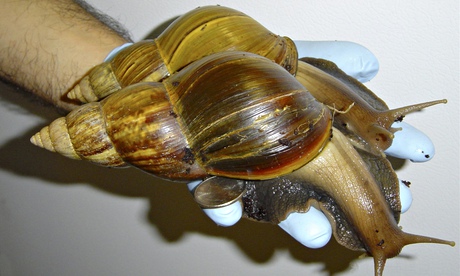Alien Invasion
Species alien to the environment to which they migrate, whether by design or by accident, usually have no natural enemies and if and when the species that have migrated, whether animal or vegetable, have not been a part of the ecology, but find the environment congenial to their prolonged presence, they prosper by settling into the new ecology finding a niche for themselves with a food source that will prolong their lives, and then they set about reproducing. And if they also happen to be particularly resourceful and thuggish by nature they are capable of pushing out native species, sometimes by aggressively growing or feeding on things that native species have always relied upon.
Whether it's kudzu, introduced from Japan, or dog-strangling vine from eastern Europe or Purple Loosestrife that overwhelm other growing things by growing up, around and over them, or the zebra mussels that have proven an aquatic pest, or the predatory oriental fish capable of spreading their nasty presence by brief overland travel from lake to lake, they're a menace. The insect or mould species that have invaded, threatening indigenous tree species like Dutch Elm disease or the Emerald Ash Borer, ensure that nature's plan is upset by an invading species of some kind when inadvertence, carelessness, or someone's decision to illegally bring a plant or a reptile from one continent to another, threatens the local environment.
The giant African snail has a reputation for damaging buildings, destroying crops, and even potentially causing meningitis in humans. Like the Asian Carp invasion, people value them for the table, as part of their cultural cuisine, and have brought them to North America where some of the fish have been loosed into local lakes, proliferated, and caused a giant headache because of the reality of their voracious appetites and threat to local species' survival.

The threat they pose to the Great Lakes is immeasurable, should they ever succeed in populating those vulnerable waters. The Florida Everglades have been invaded by alien snake species, among them the Burmese python that is capable of growing to huge dimensions, and posing a threat to all other animals in the environment, let alone human beings.


So when the U.S. Department of Agriculture discovered the presence of giant African land snails, a species that some people fancy keeping as pets, and many others view as food for the table, they were alerted to the need to destroy those animals in an attempt to halt their colonization of wherever they happen to be placed in the environment, through careless indifference to the damage they are capable of creating. The USDA seized over 200 snails from a Long Island, N.Y. individual who identified a Georgia seller as his source. From the Georgie entrepreneur they took another thousand snails.
Their swift capture wherever they appear is a necessity since they're capable of tremendous multiplication, producing 1,200 or more offspring each year. These are large snails, which grow larger than fist-size, with no natural predators. In Florida, Agriculture officials have been trying to eradicate them for three years. In Miami, they have been discovered eating plaster and stucco on houses and eating their way through plants in residential gardens.
In Florida alone, the Department of Agriculture has discovered in 26 areas 141,000 snails to be destroyed. Should they succeed in gaining entry to rich agricultural areas, the creatures which eat 500 types of plants inclusive of row crops and citrus, would be enabled to ruin entire crops. Arriving accidentally in cargo or on peoples' luggage, some are collected by hobbyists, and they're used in some African religious ceremonies, or cosmetic processes, as well as being considered an edible delicacy.

Giant African snails like these damage homes and crops and can cause meningitis, authorities say. Photograph: Scott Burton/AP
Creepily, according to the U.S. federal Centers for Disease Control and Prevention, the Giant African land snail can also carry a parasitic worm that can lead to meningitis. It remains legal to import frozen giant African snails to the U.S. and some European countries permit entry to live snails. An entomologist at the USDA specializing in snail and other species' identification intercepted in international commerce has his own safety warning: "Don't play with snails when you are on vacation."
For that matter, giant Asian carp, or Burmese pythons, as well.
Labels: Agriculture, Animal Stories, Bioscience, Chaos, Science

0 Comments:
Post a Comment
<< Home